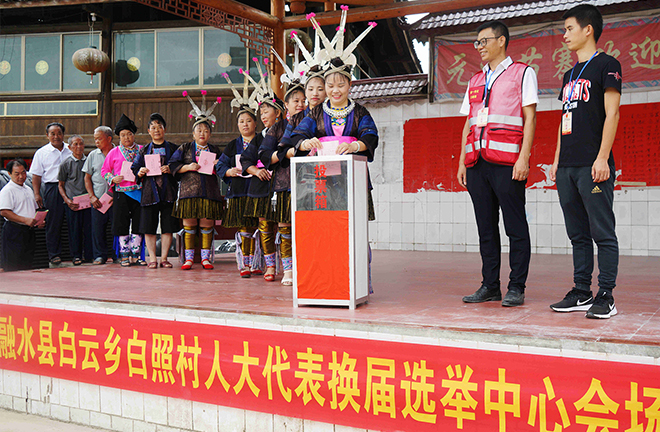Forum explores democracy as common value

Voters line up to vote for their county’s deputies to the National People’s Congress in Baizhao Village, Baiyun Township, Rongshui Miao Autonomous County, Liuzhou City, Guangxi Zhuang Autonomous Region in southwest China, on July 22. Photo:CFP
The International Forum on Democracy: the Shared Human Values opened in Beijing on Dec. 4.
Huang Kunming, a member of the Political Bureau of the CPC Central Committee and head of the Publicity Department of the CPC Central Committee, delivered a keynote speech at the forum.
Huang affirmed that democracy is a common value shared by all humanity, and an important indicator of progress in human civilization, according to the Xinhua News Agency.
The people’s status as masters of the country is the essence of China’s democracy, Huang said, adding that practice has proven the whole-process people’s democracy is a true democracy that works.
Reiterating that there is no one-size-fits-all model for democracy, Huang said the CPC and the Chinese people are willing to work together with all other peoples around the world to carry forward the common values of humanity and advance towards a global community of shared future together.
“The arduous exploration of democracy in human societies shows that the practice of democracy is constantly evolving, and the practice of democracy is most reliable and effective when it is rooted in its own country,” said Xie Fuzhan, president of the Chinese Academy of Social Sciences. Democratic theory research can have real power to explain, persuade, and appeal only when it is based on its own national conditions and is grounded in practice.
The CPC has deepened its understanding of the law of the development of democratic politics and put forward the major concept of the whole-process people’s democracy, Xie continued. The whole-process people’s democracy can unify process and results-based democracy, procedural democracy and substantive democracy, direct democracy and indirect democracy, as well as people’s democracy and state will, enriching and expanding the political, theoretical, and practical connotations of Chinese democracy.
Sponsored by the Publicity Department of the CPC Central Committee and the State Council Information Office, the forum was attended by over 500 guests from more than 120 countries and regions, and over 20 international organizations. Attendees exchanged ideas on democracy’s plural origins, ultimate value, effective principles, realization forms, and its relationship with the full development of man.
Participants expressed the view that human civilization has had many origin points and a wide variety of political systems. As such, there are multiple ways to achieve democracy. People’s pursuit of democracy varies in different countries, with different social formations and different stages of development, but it is inseparable from the social conditions on which they depend. Only broad, true, and effective democracy that pursues the full and free development of man can meet the requirements and trends of democratic development, and that is the core content and foundation of the ultimate value of democracy.
Participants believe that the whole-process people’s democracy is a new creation based on the practice of China’s political development and the construction of its national governance system. This institutional arrangement and its functions enable the CPC and the Chinese government to maintain close interactions with the people, so that they can formulate policies in a realistic and timely manner. This not only ensures policies’ smooth implementation, but also enables the policies to be continuously adjusted and improved during the democratic consultation process. The whole-process people’s democracy in China has been understood, welcomed, and supported by the people, and thus has been successful.
Edited by JIANG HONG

 PRINT
PRINT CLOSE
CLOSE